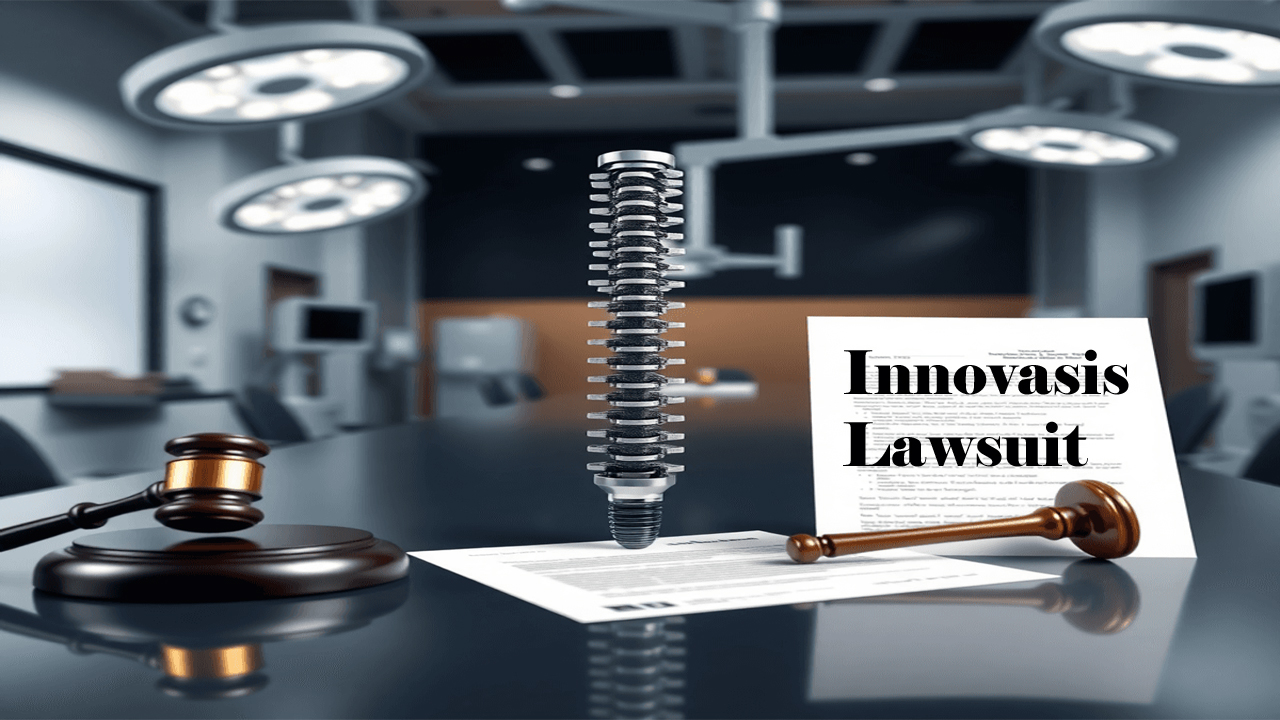The healthcare industry is facing a major legal battle as Innovasis Inc., a leading manufacturer of spinal implants, agrees to pay $12 million to settle allegations of kickback schemes targeting spine surgeons. This significant case has far-reaching implications for the medical device industry, shedding light on important issues related to healthcare ethics and patient care.
Allegations Against Innovasis
The lawsuit claims that Innovasis violated the False Claims Act by offering financial incentives to spine surgeons in order to promote the use of their devices during surgical procedures. These incentives allegedly included:
- Consulting agreements with minimal work requirements
- Fees for speaking engagements
- Research grants with limited oversight
- Luxurious travel accommodations
The Importance of the False Claims Act

The False Claims Act plays a crucial role in safeguarding the quality of patient care and protecting taxpayer funds. When medical device companies participate in kickback schemes, they undermine the integrity of healthcare decision-making processes. It is essential for surgeons to choose medical devices based on what is best for their patients, rather than being influenced by financial motives.
The Role of Spine Surgeons
Spine surgeons hold a critical position in upholding ethical practices within the healthcare system. Their choices directly affect patient outcomes and overall healthcare costs. The involvement of these specialists in kickback schemes raises concerns about various aspects, including:
- Patient safety and quality of care
- Criteria used for selecting medical devices
- Inflationary pressures on healthcare costs
- Professional integrity within the field
Implications of the Innovasis Lawsuit
This case serves as evidence of the Department of Justice’s dedication to prosecuting healthcare fraud. The settlement amount signifies the seriousness of the allegations and sends a strong message to other medical device companies engaging in similar activities.
The Innovasis lawsuit marks a significant shift in how healthcare regulations are enforced. It underscores the importance of establishing transparent relationships between medical device manufacturers and healthcare providers, ensuring that patient care remains the primary focus when making medical decisions.
Background of Innovasis Inc. and Key Figures Involved
Innovasis Inc., established in 2002, has carved a significant niche in the medical device industry through its specialized focus on spinal implant technology. Based in Salt Lake City, Utah, the company designs and manufactures a comprehensive range of spinal fusion products, including pedicle screws, interbody devices, and cervical plates.
The company’s leadership structure centers around two key executives: Brent Felix and Garth Felix. As Chief Executive Officer, Brent Felix has steered Innovasis’s strategic direction, overseeing product development and market expansion initiatives. His tenure saw the company’s rapid growth in the competitive spinal device market, with particular success in securing contracts with major healthcare providers.
Garth Felix, serving as Chief Operating Officer, has managed the operational aspects of Innovasis’s business model. His responsibilities have included:
- Supervising manufacturing processes
- Managing distribution networks
- Coordinating sales strategies
- Maintaining relationships with healthcare providers
Under their combined leadership, Innovasis developed a strong presence in the spinal implant market, reporting substantial revenue growth through their distribution of medical devices to hospitals and surgical centers across the United States. The company’s business model emphasized direct partnerships with spine surgeons, a practice that would later come under intense scrutiny.
Allegations Against Innovasis: Kickbacks and Medicare Fraud

The Justice Department’s investigation revealed a complex scheme where Innovasis allegedly provided substantial kickbacks to spine surgeons. These kickbacks took various forms, including:
- Consulting agreements with minimal work requirements
- Speaking engagements at inflated rates
- Paid travel to luxury destinations
- Research grants with questionable scientific merit
The company allegedly targeted high-volume surgeons who could significantly influence device purchases at their hospitals. Internal documents suggested these arrangements were designed to incentivize surgeons to use Innovasis spinal implants exclusively in their procedures.
The Federal Anti-Kickback Statute
The Federal Anti-Kickback Statute prohibits medical device companies from offering any form of payment to healthcare providers in exchange for using their products. This law exists to:
- Protect patient care decisions from financial influence
- Prevent unnecessary medical procedures
- Safeguard Medicare and Medicaid funds
- Maintain fair market competition
Disguising Payments and Ethical Concerns
The investigation uncovered evidence that Innovasis disguised these payments through sophisticated accounting practices. The company allegedly created fake documentation to make these kickbacks appear as legitimate business expenses.
A particularly concerning aspect was the company’s alleged practice of paying surgeons based on the volume of Innovasis devices they used. This “pay-for-play” arrangement potentially influenced surgical decisions, raising serious ethical concerns about patient care quality.
Potential Medicare Fraud
The allegations suggested that these practices led to Medicare fraud through:
- Inflated claims for unnecessary procedures
- Use of more expensive devices when cheaper alternatives were available
- False documentation to justify medical necessity
- Double-billing for consulting services
These actions allegedly resulted in millions of dollars in fraudulent Medicare claims, prompting federal authorities to launch a comprehensive investigation into Innovasis’s business practices.
The Role of Whistleblowers in Exposing Healthcare Fraud
Robert Richardson, a former Innovasis sales representative, emerged as the key whistleblower in uncovering the company’s fraudulent practices. His insider position provided crucial evidence of the kickback scheme, leading to the groundbreaking lawsuit against the medical device manufacturer.
The False Claims Act’s qui tam provisions played a vital role in Richardson’s decision to step forward. These provisions protect whistleblowers from retaliation while offering financial incentives – typically 15-30% of the recovered funds. This legal framework has proven effective in encouraging individuals to report healthcare fraud.
Whistleblower Rights Under Qui Tam Provisions
Under qui tam provisions, whistleblowers can:
- File lawsuits on behalf of the government
- Maintain confidentiality during initial investigations
- Receive protection from workplace retaliation
- Secure a percentage of recovered funds as compensation
The Justice Department’s data reveals that whistleblower-initiated cases have recovered billions in fraudulent healthcare claims. In 2022 alone, qui tam cases led to the recovery of $1.9 billion in settlements and judgments.
Richardson’s case highlights the critical role of industry insiders in protecting public funds and maintaining healthcare integrity. His actions sparked a thorough investigation that ultimately exposed systemic violations within Innovasis’s business practices.
Legal Consequences for Innovasis: Settlement and Financial Implications
The Justice Department’s Civil Division reached a significant $12 million settlement with Innovasis Inc., marking a substantial victory in the fight against healthcare fraud. This settlement stands as a testament to the government’s commitment to prosecuting violations of the False Claims Act and the Anti-Kickback Statute.
Breakdown of the Settlement Amount
The settlement amount breaks down into several components:
- $10.5 million in direct penalties
- $1.5 million in compliance monitoring costs
- Additional legal fees and administrative expenses
Strict Oversight Requirements for Innovasis
Beyond the immediate financial impact, Innovasis faces strict oversight requirements:
- Implementation of enhanced compliance programs
- Regular audits by independent monitors
- Mandatory reporting of financial transactions
- Restrictions on certain business practices
Personal Liability for Innovasis Executives
The settlement’s ripple effects extend to Innovasis executives Brent Felix and Garth Felix, who bear personal liability for specific portions of the penalties. This personal accountability sets a precedent for future cases involving medical device company leadership.
Message to the Medical Device Industry
The Justice Department’s successful prosecution sends a clear message to the medical device industry: kickback schemes targeting healthcare providers carry severe financial consequences. This settlement ranks among the top enforcement actions against medical device manufacturers in recent years.
Additional Challenges for Innovasis
The company must also navigate:
- Potential loss of business partnerships
- Damaged reputation in the healthcare sector
- Increased scrutiny from regulatory bodies
- Higher insurance premiums
- Restricted access to government contracts
These financial implications reshape Innovasis’s business model and serve as a deterrent to other companies considering similar practices in the medical device industry.
Preventing Future Fraud: Compliance Measures Post-Innovasis Settlement
The Innovasis lawsuit has sparked essential changes in healthcare compliance protocols. Organizations now recognize the critical need for comprehensive compliance programs that go beyond basic regulatory requirements.
A robust compliance framework includes:
- Regular Internal Audits: Systematic review of financial transactions, particularly those involving healthcare providers
- Documentation Standards: Clear protocols for recording and justifying all provider relationships
- Anonymous Reporting Systems: Protected channels for employees to report suspicious activities
- Ethics Committees: Independent oversight groups to evaluate business practices
Employee training stands as a cornerstone of effective fraud prevention. Healthcare organizations are implementing:
- Real-world case studies from actual fraud investigations
- Interactive workshops on identifying red flags
- Role-playing scenarios for handling ethical dilemmas
- Regular updates on changing healthcare regulations
Leading healthcare institutions have adopted a “culture of compliance” approach, where ethical behavior is woven into daily operations. This includes:
- Monthly compliance newsletters
- Department-specific training modules
- Peer-led discussion groups
- Recognition programs for ethical leadership
These measures create multiple layers of protection against fraudulent activities. Organizations that invest in comprehensive compliance programs demonstrate their commitment to maintaining high ethical standards while protecting patient interests and public resources.
The healthcare industry continues to evolve its approach to compliance, learning from cases like Innovasis to strengthen preventive measures and build more resilient systems against fraud.
The Ongoing Battle Against Healthcare Fraud: Enforcement Efforts and Future Outlook
The Department of Justice’s aggressive stance against healthcare fraud has led to record-breaking recoveries in recent years. In 2022 alone, the DOJ recovered $2.2 billion from healthcare fraud settlements and judgments, with medical device companies under increased scrutiny.
Strengthened Enforcement Capabilities
Recent amendments to the Anti-Kickback Statute have strengthened enforcement capabilities:
- Enhanced penalties – Violations now carry fines up to $100,000 per incident
- Broader scope – The statute covers additional forms of remuneration beyond direct payments
- Stricter documentation requirements for consulting agreements and speaker programs
Renewed Interest in Spine Device Manufacturer Practices
The Innovasis case has sparked renewed interest in spine device manufacturer practices. The DOJ has launched investigations into several other companies suspected of similar kickback schemes, signaling heightened enforcement in this sector.
Key Enforcement Priorities
Key enforcement priorities include:
- Monitoring surgeon-owned distributorships
- Scrutinizing consulting arrangements between physicians and device makers
- Investigating marketing practices and sales representative compensation models
Technology-Driven Approach to Detecting Fraud
The Office of Inspector General has also implemented data analytics tools to detect suspicious billing patterns and relationships between providers and medical device companies. This technology-driven approach helps identify potential fraud schemes earlier and builds stronger cases against violators.
Risks for Medical Device Companies
These enhanced enforcement mechanisms create significant risks for medical device companies operating without robust compliance programs. The precedent set by the Innovasis settlement suggests future cases may result in even larger penalties, especially for repeat offenders or systemic violations.
The Ongoing Battle Against Healthcare Fraud: Enforcement Efforts and Future Outlook
The Department of Justice’s aggressive pursuit of healthcare fraud cases signals a new era in medical device industry oversight. Recent amendments to the Anti-Kickback Statute have strengthened prosecutors’ ability to target fraudulent practices, with heightened penalties and expanded investigative powers.
Current Enforcement Efforts
The Office of Inspector General has intensified its monitoring of medical device companies through:
- Advanced data analytics to detect suspicious billing patterns
- Increased collaboration with whistleblowers
- Enhanced auditing of physician-industry relationships
- Stricter documentation requirements for device usage
These enforcement efforts have already yielded results, with a 50% increase in healthcare fraud recoveries compared to previous years. Medical device companies face unprecedented scrutiny of their marketing practices and financial relationships with healthcare providers.
Future Predictions
Looking ahead, industry experts predict:
- More rigorous compliance requirements for device manufacturers
- Greater transparency in physician payment reporting
- Increased focus on value-based care models
- Enhanced protections for whistleblowers
The Innovasis case has set a powerful precedent for future enforcement actions. Medical device companies must adapt to this evolving regulatory landscape by prioritizing ethical practices and patient outcomes over profit margins. The industry’s future depends on maintaining public trust through demonstrated commitment to compliance and transparency.
FAQs (Frequently Asked Questions)
What is the Innovasis lawsuit about and why is it significant for the healthcare industry?
The Innovasis lawsuit involves allegations of Medicare fraud and kickbacks to spine surgeons by Innovasis Inc., a medical device company specializing in spinal implants. This case highlights the importance of adhering to the False Claims Act to ensure patient care quality and protect taxpayer funds, making it significant for the healthcare industry.
Who are Brent Felix and Garth Felix in relation to Innovasis Inc.?
Brent Felix and Garth Felix are key executives at Innovasis Inc. Their roles significantly influenced the operations of the company, which faced allegations related to providing kickbacks to spine surgeons, violating federal statutes.
What specific allegations were made against Innovasis regarding kickbacks and Medicare fraud?
Innovasis was accused of providing kickbacks to spine surgeons as incentives to use their spinal implant devices. These actions violated the Federal Anti-Kickback Statute, which prohibits financial incentives that could compromise patient care quality.
How did whistleblower Robert Richardson contribute to exposing the Innovasis fraud?
Robert Richardson acted as a whistleblower under qui tam provisions, which incentivize individuals to report fraudulent activities in healthcare. His role was crucial in bringing the Innovasis lawsuit to light, aiding enforcement efforts against healthcare fraud.
What were the legal consequences for Innovasis following the lawsuit?
Innovasis reached a $12 million settlement with the Justice Department’s Civil Division, marking one of the largest settlements involving a medical device company in a healthcare fraud case. The settlement included financial penalties affecting both the company and its executives.
What measures have been recommended post-Innovasis settlement to prevent future healthcare fraud?
Post-settlement recommendations emphasize implementing robust compliance programs within healthcare organizations, including comprehensive employee training. These measures aim to promote awareness of fraudulent activities and foster a culture of integrity to safeguard patient care quality and taxpayer funds.





One thought on “Innovasis Lawsuit: Surprising Developments and Predictions”